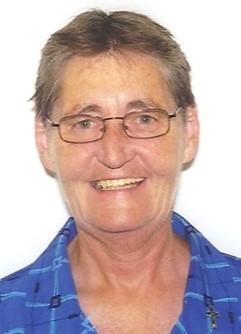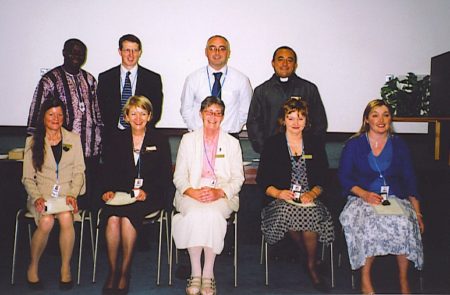 Pat O’Donovan rsm
Pat O’Donovan rsm
Professional chaplaincy, which is part of the wider pastoral care movement, is a relatively recent and significant development within the churches and within healthcare in Ireland. We Mercy Sisters, who participate in the healing ministry of Christ by becoming specialists in pastoral care, see ourselves as part of a rich tradition of Mercy Healthcare of which we are justly proud. While honouring that tradition, we are also aware of our responsibility to creatively and effectively carry forward the torch of Mercy, offering tender care and healing presence, probably at a time when religiously motivated care is more important than ever. That presents substantial ministerial and professional challenges that need to be discerned, acknowledged and addressed, in order to be true to our calling as ministers of healing ‘Centred in the God of Mercy.’
The practice of chaplaincy is a journey of transformation. It calls for a contemplative gaze and stance in the face of human vulnerability and mortality. We are privileged to have access to, and to be part of a rich Mercy tradition of service and mysticism from which we draw inspiration, courage and wisdom while engaging that journey. As spiritual care specialists within what is now an interfaith and multicultural healthcare milieu, populated by many specialists, we express our caring analogically with the caring of our relational God, humbly acknowledging the depth and mystery in each person.
The context within which we offer spiritual care and emotional support reflects a society in rapid transition, and currently experiencing recession after unprecedented affluence and prosperity. Our ministry outreach invites us to empathic pastoral engagement, crossing the threshold of human pain: physical, spiritual and emotional. Our encounters make us intensely conscious of the troubling and harsh realities that create or contribute to human suffering and anguish in our time: loss of meaning, social and economic inequality, unprecedented levels of violence and gang warfare, worrying homicide and suicide rates, a flourishing drug culture, spiralling addiction statistics, and new kinds of healthcare issues and concerns. These are ‘extra’ to the normal levels of illness and death that are part of life within society or family, in any era. Attitudes and behaviours that reflect racism, sexism, sectarianism, ageism, homophobia, and other expressions of prejudice are quite prevalent. Within this milieu, our pastoral interaction as Mercy chaplains has to reflect an authentic expression of faith, hope and love in order to be experienced as credible. We are additionally challenged to develop cultural competence and cultural humility so that we can interact effectively as ministers within diversity.
The healthcare facilities within which we practice this very old ministry, and relatively new profession, are microcosms of the wider society with all of its complexity. As theologically and clinically trained professionals we are acutely aware of an essential element of our ministry: the importance of staying focused on mission through contemplation. Only by remaining faithful to our call to contemplation and to our commitment to mission are we empowered to encounter the raw reality of pain, and hear the cry for mercy of a suffering God within the broken lives of our fragile and vulnerable sisters and brothers. Our ministry as healthcare chaplains is our response, in our time, to the challenge of Christ’s Mercy mission to bring hope and healing to what one of my CPE students described as “reservoirs of suffering.” The clearly stated position of our Mercy healthcare institutions, and of other religious sponsored hospitals, is faith based and values driven. Most of the long established non-denominational hospitals had a recognisable religious ethos until relatively recently. In previous times many of our senior sisters played significant roles in nursing, administration and catering within these facilities. Traditionally, spiritual care was expected and provided quite readily alongside medical and nursing care. The scene is now quite different. As competent spiritual care providers we are continually negotiating our role and boundaries within what has become a healthcare industry. We persistently confront the challenge of offering a truly tender and healing touch, through Presence, Word and Sacrament within a healthcare milieu where clinical staff have increasingly more divergent opinions around whether to encourage or ignore spirituality in patient treatment and in patient care plans.
The practice of chaplaincy is a journey of Transformation. It is an outreach ministry that starts with coming home to our true selves. Through a rigorous and demanding formation process we are invited to risk becoming vulnerable in encountering our own depth and darkness. It is a process where the focus is always on transformational learning and on transformational practice. By continually returning to that deep and sacred place, listening to the whispers of the Spirit, our energy and passion for chaplaincy is revitalised. Our journey with patients and family members leads us to the garden of Agony, to the Foot of the Cross, to the loneliness and isolation of the Tomb, to moments where we experience and rejoice in glimpses of Resurrection, and to conversations where the presence and power of the Spirit is truly palpable.
An authentic response to our privileged calling entails emotional availability and spiritual accompaniment when sharing in these sacred and sometimes raw texts from the pages of Living Human Documents, and the Living Human Web.
 CPE Students at St. Vincent’s University Hospital
CPE Students at St. Vincent’s University Hospital
As chaplains, endorsed by Mercy, and charged with ministering at the coalface of human limitations and suffering, we look to our Mercy sisterhood for a community of support and accountability within which to grow spiritually and professionally. Held in prayer, especially by those whose legacy of care we honour and cherish, we continue to navigate our voyage in an ocean of suffering, collaborating with our disenfranchised, and promoting holistic care for all. Drawing on the inspiration and challenge of a long tradition of Mercy in healthcare, we embrace our calling to be a permeating presence, promoting spiritual, emotional and physical healing within today’s healthcare milieu.
Pat O’Donovan is Director of Clinical Pastoral Education at St. Vincent’s University Hospital, Dublin. She is the current Chairperson of the Healthcare Chaplaincy Board. The Board is a Standing Committee of the Catholic Healthcare Commission, and is responsible for the Certification of Healthcare Chaplains, and for the Accreditation of Clinical Pastoral Education Programmes.
Pat O’Donovan rsm
South Central Province


